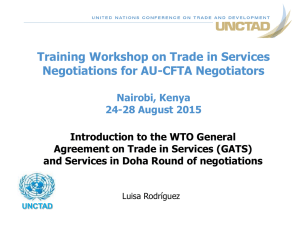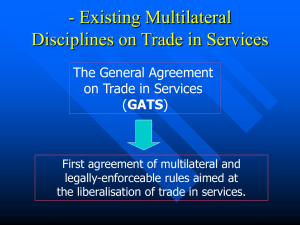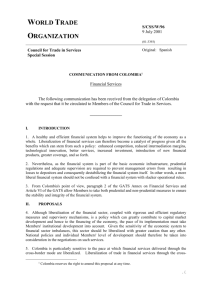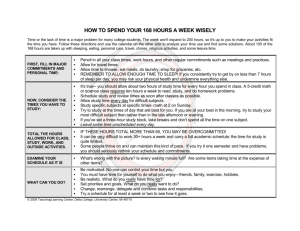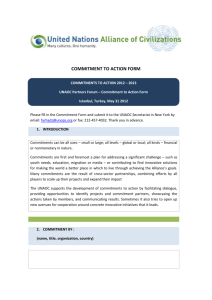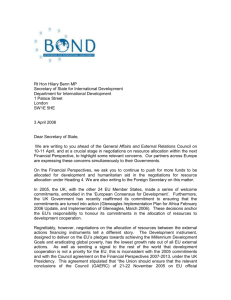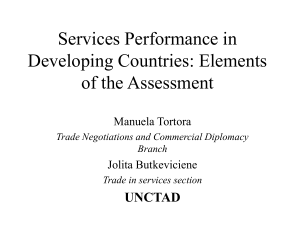Training Workshop on Trade in Services Negotiations for AU
advertisement
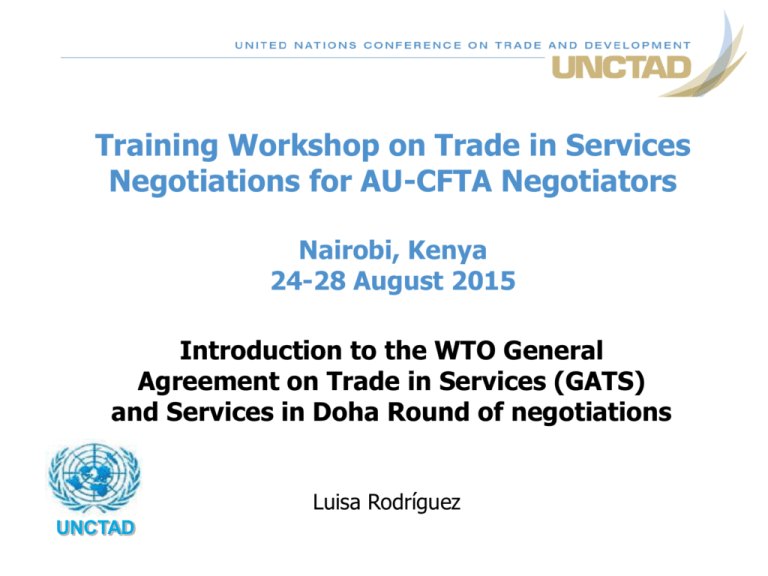
Training Workshop on Trade in Services Negotiations for AU-CFTA Negotiators Nairobi, Kenya 24-28 August 2015 Introduction to the WTO General Agreement on Trade in Services (GATS) and Services in Doha Round of negotiations Luisa Rodríguez UNCTAD Outline • Part I. GATS: Key concepts and provisions – – – – – Objectives of the GATS Definition of services trade Ways of trading services Scope of the agreement Some specific provisions • Part II: Assessment of UR commitments – Per sector, per depth of commitment – The experience of implementing UR commitments • Ongoing Doha negotiations on services – Issues areas and mandates Part I GATS: Key concepts and provisions Objectives of the GATS: 1. Expanding trade as a means for development 2. Achieving progressively higher levels of liberalization – Due respect to national policy objectives – Respect for the right to regulate to meet national policy objectives 3. Facilitating the increasing participation of DC in world services trade Services Sectors (WTO classification list W/120) 1. Business services 2. Communication services 3. Construction services 4. Distribution services 5. Educational services 6. Environmental services 7. Financial services 8. Health-related and social services 9. Tourism and travelrelated services 10. Recreational, cultural and sporting services 11. Transport services Definition of services trade Modes of Supplying a Service (Article I) • Mode 1: Cross-border Trade – From the territory of one Member into the territory of any other Member • Example: Software, insurance or telediagnosis from country B into A • Mode 2: Consumption Abroad – In the territory of one Member to the service consumer of any other Member • Example: A’s resident obtains hospital treatment or education in B Definition of services trade Modes of Supplying a Service (Article I) • Mode 3: Commercial Presence – By a service supplier of one Member, through commercial presence in the territory of any other Member; • Example: Bank, telecommunications firm or hospital from B sets up foreign direct investment (FDI) subsidiary in A • Mode 4: Movement of Natural Persons – By a service supplier of one Member, through presence of natural persons of a Member in the territory of any other Member • Example: Engineer or doctor from B provides services in A Ways of trading services Exporter Importer Exporter Importer 2 1 «Producer» « Product » «Producer» Consumer Consumer 3 4 Consumer Consumer «Producer» - Company «Producer» - Professional Scope of the Agreement (Article I) • All measures affecting trade in services taken by central, regional or local governments and non-governmental bodies • Services include any service in any sector except services supplied in the exercise of governmental authority • The spectrum of international service transactions includes investment and labour GATS contains provisions regarding Economic Integration (GATS Article V) • Eco integration agreement can be entered into by WTO Members provided that such agreements: – have substantial sectoral coverage, – provide for the absence or elimination of substantially all discrimination, between or among the parties, and – do not raise the overall level of barriers to trade in services, in respect of any Member outside the agreement GATS contains provisions regarding Recognition (Article VII) • WTO Members may recognize the education or experience obtained, requirements met, or licenses or certifications granted of other Members • Such recognition can be achieved: - through harmonization or otherwise, - can be based upon an agreement or arrangement with the country concerned or - may be accorded autonomously • Member that is a party to a recognition agreement must afford adequate opportunity for other interested Members to negotiate their accession to the agreement or to negotiate comparable ones with it GATS contains disciplines regarding: • Transparency – Notification of measures affecting the operation of the agreement • Domestic regulation – Mechanisms to review and provide remedies for administrative decisions affecting trade in services • Monopolies and exclusive services suppliers – Ensuring they do not act in a manner that is inconsistent with MFN or restrict trade • Payments and transfers – Ensuring capital transactions (payments are transfers) are not restricted • Prudential carve-out Financialspecific Part II: Assessment of UR commitments Assessment UR commitments (per sector) • Scope of GATS = 12 sectors / 160 subsectors – On average, each country included commitments on 1/3 of subsectors • Sectors with most commitments: – Tourism – Financial – Business services – Telecom • Sectors with least commitments – Transport – Audiovisual – Health – Education • Accession commitments post-UR included: – Infrastructure services – Construction services Assessment UR commitments (per depth of commitment) • • • • • • Most commitments on Mode 2 without limitations Commitments on Mode 4 very limited Full commitment on Mode 1 and 3 are the exception Commitments on Mode 3 with limitations High proportion of unbound commitments on Mode 1 Sectoral limitations affect financial services and professional services • Acceding countries (post UR) assumed full commitments for Modes 1, 2 and 3 Assessment UR commitments (implementation of GATS) • More flexible structure assuming commitments – Less controversial – Imprecise commitments – Bound existing market opening, hence did not created significant market access • More opening on mode 3 (dev/ed country interest) in contrast with mode 4 (dev/ing country interest) • “Weak” rules with respect to domestic regulation • Link between liberalization and investment attraction • Lessons learnt with respect to sequencing liberalization and reform Evolution of trade in services • The dynamism of trade in services – The outsourcing phenomenon • Technological advances enable cross-border trade of services by electronic means • Proliferation of regional trade agreements Part III: Ongoing Doha negotiations on services Issues areas and mandates 1. Liberalization 2. New provisions / disciplines – Practices having a distorting effect on trade 3. Specific concerns of developing countries and LDCs 1) Liberalization • Doha mandate: achieve a progressively higher level of liberalization through successive rounds of negotiations • Objective: reduce barriers to free trade of services – Reducing government policy interventions.. – ..that may be applied after a service has entered a market Market access - 1 • How do we do this? – Request and offer, bilateral, plurilateral and multilateral • Assessment of what is currently on the table – The signaling conference • Unsatisfactory quality of offers (in terms of new sectors and improvements) Market access - 2 • Sectors where offers concentrate: – Business services (professional, CRS..), telecom, financial, maritime and tourism – MFN exemptions: majority still exists • Sectors where less attention is given: education, distribution, postal and courier, road transport, entertainment, audiovisual and health • Modes: Mode 3 > Mode 1 and 4 2) New provisions / disciplines • Objective: – Clarifying existing rules and improving those that could have a distorting effect on trade • Mandates and status of negotiations – Subsidies – Domestic regulation – ESM – Government procurement 3) Specific concerns of developing countries • Special and Differential Treatment – Appropriate flexibility for D/ing country in opening • Recognition of serious difficulty confronted by LDCs (exempted in Doha) • Facilitate increased participation of Dev/ing countries and LDCs in international trade in services – Access for sectors and modes of interest to D/ing countries • Special priority given to LDCs – LDC modalities: preference through MFN waiver – Technical cooperation and capacity building Conclusions • After a 15 year experience of implementing WTO services provisions: – The UR bound the regulatory status quo of 1995 – Mixed results with respect to export interests of dev/ing countries and investment expectations – Lesson learnt: taking advantage of liberalization implies sequencing reforms (complexity) – Unfinished business with respect to: • Subsidies, safeguards, public procurement, domestic regulation • Improving market access and practices related scheduling • Will have to consider changes that will occur in trading services as a result of technological advancements. Thank you Luisa Rodriguez Trade Negotiations and Commercial Diplomacy Branch UNCTAD Luisa.Rodriguez@unctad.org
